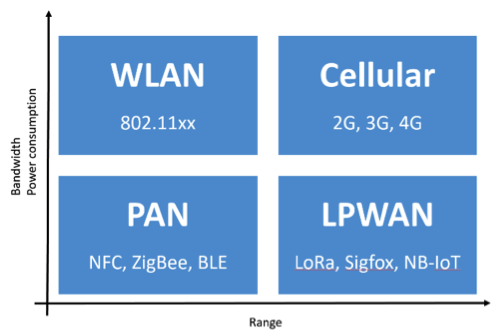The Internet of Things (IoT) has been a trending topic for the past few years in talks, conferences and newspapers and you have probably heard or read about it already. Analysts predict that ‘everything’ will be connected and industry is pushing to deliver this vision and to open new markets.
Although IoT is not new at CERN – you may remember “Computer Security: IoTs: The Treasure trove of CERN” – new user requirements and hence technologies keep appearing on the market.
A key way to distinguish the different requirements is by their bandwidth requirements and the range over which communication is needed. As shown in the diagram, these needs are met by different technologies.

If you have power available you can afford to have higher bandwidth and hence data throughput. You can then connect to the Ethernet network, to the renewed Wi-Fi service or to the mobile network if you are out of Wi-Fi range. Personal Area Networks (PAN) offer you a solution if your device is only a few centimeters/meters away. Bluetooth printers or contactless cards using RFID (Radio-Frequency Identification) or NFC (Near-Field Communication) are just some PAN examples.
“When you are not connected to the electrical grid, there is a trade-off between the range over which you can communicate with your device, its maximum data rate and its power consumption,” says Hubert Odziemczyk, the IT engineer developing the new LoRaWAN network. “Take your Bluetooth headsets as an example; you can have HD audio on them but you need to recharge them daily and cannot go further than 10 meters from the source.”
An LPWAN (Low-Power Wireless Area Network) provides long range (up to several kilometers) communication capability to low power consumption devices (up to several years without changing the battery) in a cost-effective way (low-device cost). The price to pay is the low bit rate (few kbps).
An LPWAN is the perfect match for any kind of sensor or meter sending small amounts of data several times per day. These networks are conceived to support a massive number of devices since they spend most of their time silent.
CERN is introducing a Proof of Concept for a new LPWAN network based on LoRaWAN. You can now connect any LoRa device above ground anywhere on the CERN campus.
The list of applications is countless:
- Smart buildings: presence, temperature/humidity, opinion beacons, glass break…
- Smart cities: water leakage, flood sensors, waste management, parking…
- Environnent monitoring: air pollution, radiation, noise…
- Industrial: vehicles tracking, door opening sensors, industrial standard bridges…
Do you have a use case you would like to discuss? Please, contact lora-support@cern.ch to start using the new network.
Rodrigo Sierra
Please, read this IoT-related Computer Security article if you have not already done so.
